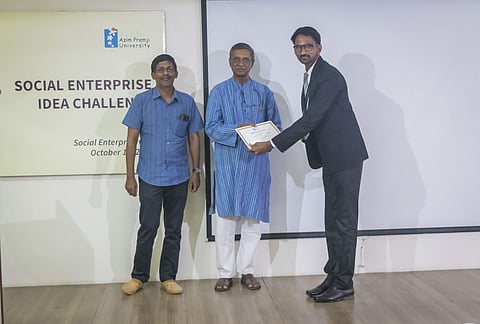

At a time when many engineering graduates prefer to travel abroad to pursue their master's or find a job and settle there to earn some good money, here is an engineering graduate who decided to stay back and is working as a research scholar at Mahakal Institute of Technology (MIT) in Ujjain. Meet Jitendra Singh Choudhary who has researched for four and a half years to develop a machine that can recycle water. Hailing from a small village in Ratlam, Madhya Pradesh, Jitendra completed his Mechanical Engineering degree in 2017 from MIT. He then went on to apply for the post of a research assistant at the MIT Group of Institutions. It was during his degree when he started working on a project, which he later went on to name Shuddham, to bring out a prototype of a machine that can recycle water.
So, the first question we had for him was quite straightforward — What made him invent this machine to recycle water? "When I went to Rajasthan once for a trip, I realised that people were going through a huge water crisis. I noticed that many people, who were taking a bath on the river banks and even lakes and river ghats. stored their bathing water in vessels. They would later use that for gardening and other purposes like washing clothes. Their practicality fascinated me. So I thought, why not reuse scientifically-cleaned bathing water," he says. He further explains how he had to spend sleepless nights and make bigger sacrifices to come out with a product that can benefit everyone. "I started reading many theses by scientists from different universities and countries on the methods used to recycle water and some had even invented a machine to do this. But their machines run on electricity. I wanted to create a machine that could work without electricity, so that paying the electricity bill later would not be a burden on the buyer's wallet," says Jitendra, the son of a farmer.
Well, a machine that recycles water and that too without using electricity — all that we wanted to know was how and with our curious minds, we asked him if the machine works with the help of a battery. And pat came the reply, "Absolutely not! The entire machine runs on granules and gravitational force. There are huge granules fixed inside the machine which cleans water when it falls from the top, using gravitational force. This used water gets purified at various stages. After the dirty particles get washed off, the last stage is to make it odour-free. Water passes through activated carbon, thus giving you a product that is clean and clear. This can be used for gardening, washing clothes, in toilets and to clean vehicles." The Shuddham machine has even been installed in MIT college hostels and it recycles around 500 litres of water every day, which helps them save 60,000 litres of water. The recycled water is used for bathing, gardening and all other purposes, except for drinking and cooking. Before installing the machine, the clean water samples were tested at different labs and many modifications were made to gain the best result.
While the machine costs around 7,000 rupees, its maintenance cost includes changing the granules, which does not cost more than 540 rupees. Every six months or once they reach a target of 90,000 litres, the granules have to be changed. There are four granules which weigh around 160 kg. "Since the machine has been filed under the Copyright Act, we take complete responsibility to provide the granules to those who install this machine," Jitendra says proudly. After word about Jitendra's invention got out, many organisations including educational institutions, hotels and hospitals in Madhya Pradesh have come forward to install this machine. However, he and MIT have not agreed to jump into this manufacturing and sales venture without a financial backup and huge investments.
"Many organisations in Rajasthan have come forward to install this water recycling machine and we have got a bulk order to manufacture 1,000 machines. We are looking for some investors to fund this and also invest in research and development to make more modifications. I have approached a few private companies and presented the idea to them. I am also hopeful that MIT itself will invest some amount to manufacture these machines. I have also submitted a letter to the Madhya Pradesh District Collector, Manish Singh requesting the State Government to provide some money for this noble project. If nothing works out, I would like to check with various government schemes and also apply for a bank loan," Jitendra says confidently. Having come from a poor background, he says, "It was not easy for my parents to help me complete my degree. They struggled a lot to gather money for my education. One cannot expect profits and regular earnings when into agriculture and that when the state is facing a water crisis. I had decided that no matter what, I should complete my degree and start earning soon. It is a big deal for my family that I have become a research scholar now."
